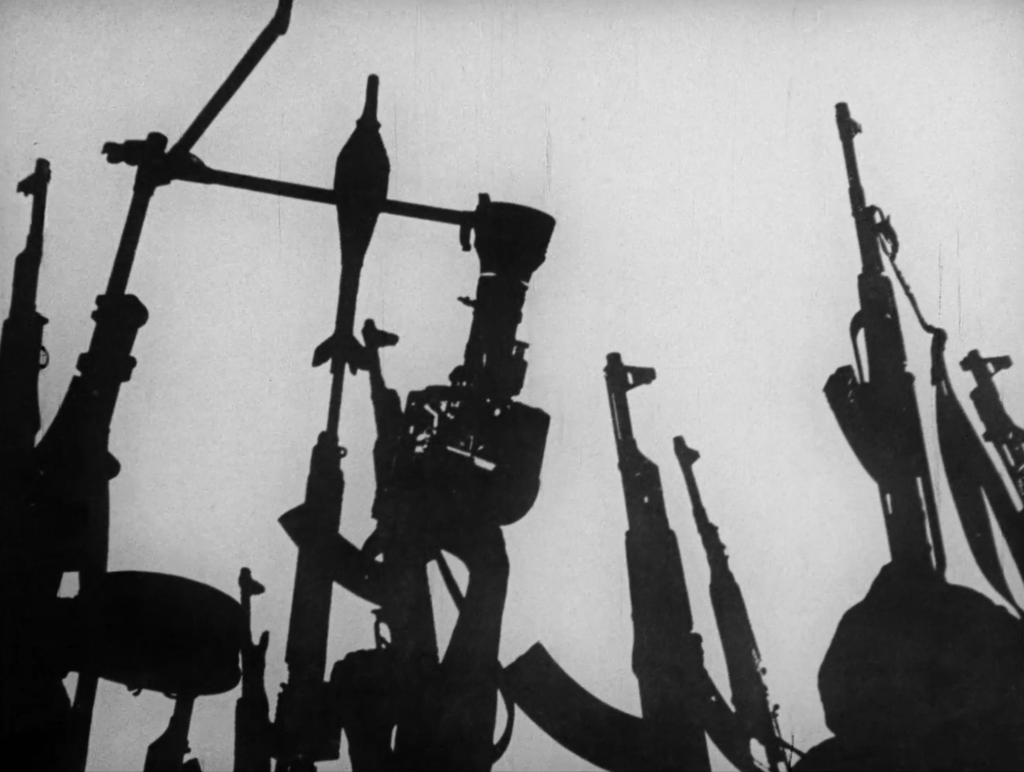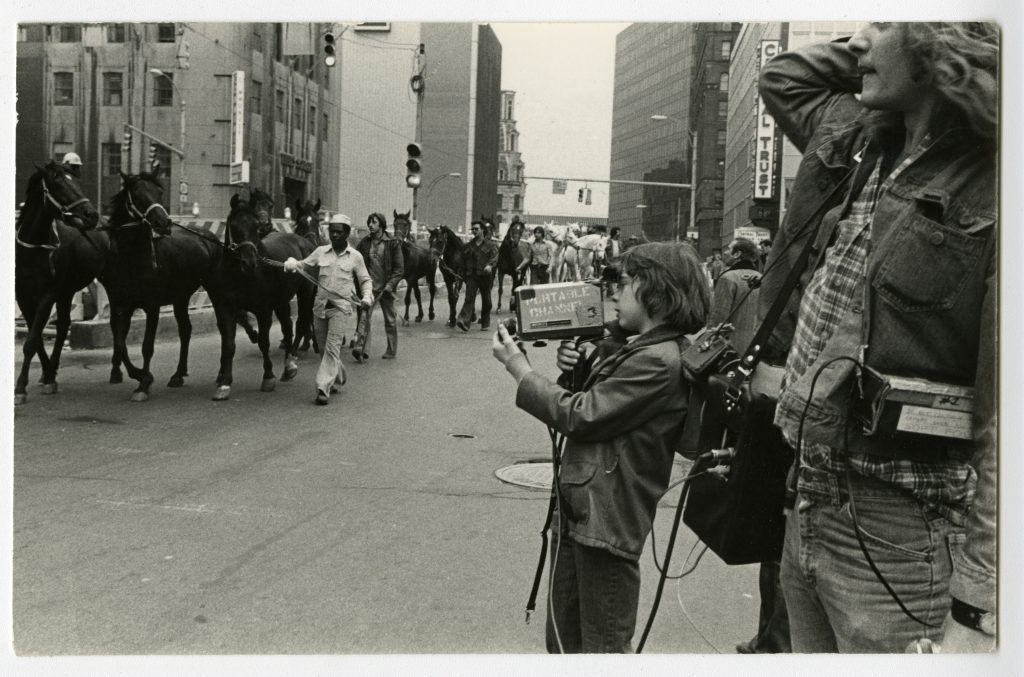VSW Salon, Fall 2021 October 28: A Collective Image: Portable Channel & The Palestine Film Unit
6 pm: Open Studio with VSW Residents Kelly Sears and Rebecca Aloisio
7 pm: Film Screening
*PROOF OF VACCINATION REQUIRED FOR ENTRY. Face Masks must be worn by all participants.
This program features archival video from Portable Channel (USA) and the Palestine Film Unit (Palestine), two collectively organized activist groups that used film and video to document, discuss and distribute information that was not accurately or adequately represented in mainstream media.
This is the fourth program in the Framing Struggle series. Tracing image production strategies developed within and alongside social movements here and elsewhere, this four part film series sets out to produce a new discursive space for reading movies as expressions of solidarity. Curated by Casey Asprooth Jackson
Program: (Film Titles are hyperlinks to the entire film)
They Do Not Exist (1974), 25 mins
Dir. Mustafa Abu Ali
Shooting under extraordinary conditions, Mustafa Abu Ali covers conditions in Lebanon’s refugee camps, the effects of Israeli bombardments, and the lives of guerrillas in training camps. They Do Not Exist is a stylistically unique work which explodes at the intersection between the political and the aesthetic.
Palestine in the Eye (1976), 29 mins
Dir. Mustafa Abu Ali (for the PFU)
A film eulogy crafted by his PFU collaborators, Palestine in the Eye (1976) chronicles the life and work of Hani Jawharieh, the militant cinematographer and co-founder of the Palestine Film Unit. Interviews with his family members and comrades paint a portrait of an artist whose genesis – and tragic end – was found in collective action, on the frontlines of the Palestinian Revolution.
Community of Witness (1972), 28 min
Sanford Rockowitz and Larry Gale
Portable Channel
“An insight into the process of religiously-oriented civil disobedience. During Holy Week of 1972, theology students strung a chain around the Federal Building where the trial of the Harrisburg Seven was taking place, symbolically arresting the building to protest the trial and the Vietnam War. Portable Channel was there, having travelled to Harrisburg with participants from Colgate Rochester Divinity School and St. Bernard’s Seminary.” – from the Portable Channel catalog, 1975
Post-Screening Discussion with Sandy Rockowitz (Portable Channel) and Tara Nelson (VSW)
 Palestine in the Eye (1976)
Palestine in the Eye (1976)Formed in Jordan in 1968 by Mustafa Abu Ali, Hani Jawharieh and Sulafa Jadalah, the Palestine Film Unit became the film-wing of the Palestine Liberation Organization, producing militant documentaries for some fourteen years. Shooting on 16mm film cameras, the members of the PFU collected documentation from below, on battlefields and in refugee camps, forging an image of Palestine the world had yet to see. Theirs was a self-representation born of necessity, developed for and through the struggle for Palestine’s liberation. Editing from footage gathered collectively, they released films in response to the developments of the revolution, producing a cinematic language in conversation with anti-imperialist struggles from Cuba to Vietnam.
Portable Channel was a Rochester, NY non-profit (1971–1987) founded by documentary filmmaker and activist Bonnie Sherr Klein. Portable Channel facilitated community access to video equipment, provided training, and produced programs with an emphasis on community activism and documentary work. Their mission was to develop television into a medium for social dialog and artistic expression, with production by and for people within a community. Under Klein’s leadership (1971- 1975) Portable Channel developed a relationship with the public television station WXXI-TV, who gave the group a monthly slot that aired their program HOMEMADE TV. Portable Channel’s legacy to document citizens’ perspectives on race, policing, imprisonment, the environment, women and gender, independent news media, and the presentation of experimental video art is uniquely in dialog with social and political concerns now, nearly 50 years later. VSW owns the PC archives and has digitized 200 of the earliest videotapes in the collection.
 Portable Channel
Portable Channel
The VSW Salon is made possible by the New York State Council on the Arts with the support of Governor Andrew M. Cuomo and the New York State Legislature, and by the ArtWorks program of the National Endowment for the Arts.

